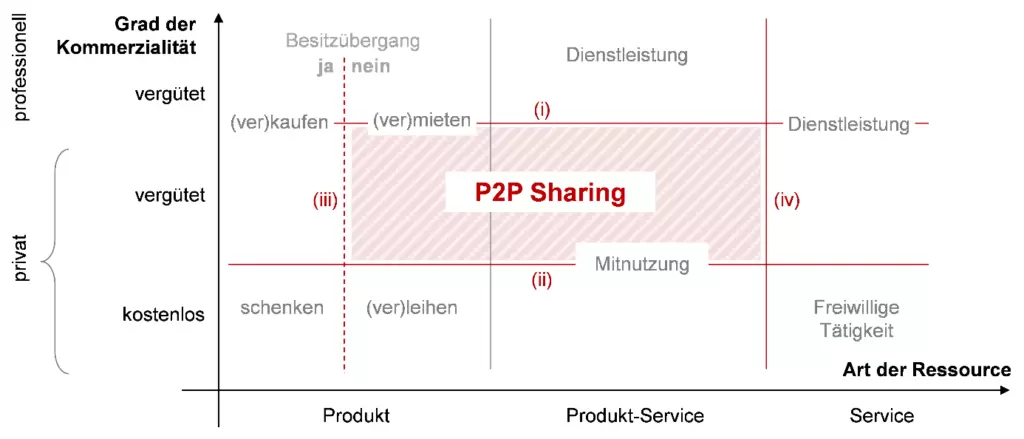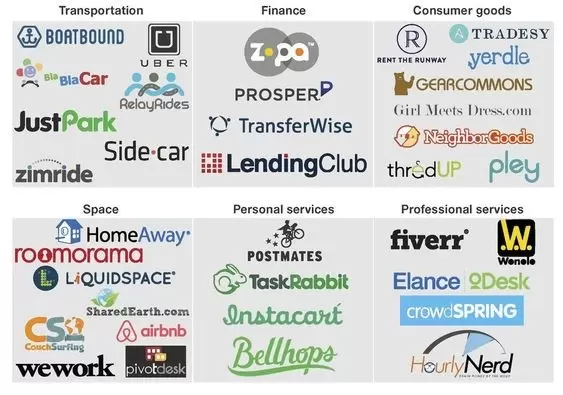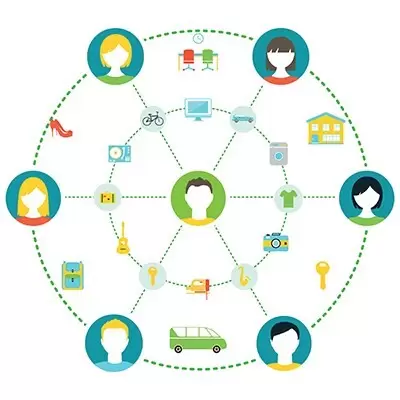What is Sharing Economy?
Sharing Economy is in trend. More and more people are renting and leasing products and services via online platforms. This leads to a more efficient allocation of goods such as cars or apartments. Thus, the waste of resources will be reduced. However, the profiteers of the sharing economy are also private persons, who can offer their goods and skills to a previously hardly accessible global network without great costs and risks. [3]
Definition
The term “Sharing Economy” refers to the systematic lending of objects and mutual provision of objects, spaces and areas, especially by private individuals and interest groups. [5]

History
In 2015, the term “Sharing Economy” made it onto the British dictionary service Oxford Dictionaries. The flagships of the Sharing Economy are the companies such as the accommodation platform Airbnb or the ride service provider Uber. The principle of sharing and renting is not in itself a new phenomenon. The Swiss car-sharing company Mobility was founded back in the 1990s. The sharing economy as we know it today developed seven to eight years ago as a result of digitalization and the spread of smartphones.
Despite great success, the Sharing Economy is probably only in its infancy. According to European Union estimates that European-wide has potential of 570 billion euros, a multiple of today’s market volume of 28 billion euros. Investor interest is high: Investments in Sharing Economy Start-ups have risen globally from $300 million annually in 2010 to more than $14 billion in 2015. [3]
Platforms
This is a modern form of market economy in which transactions (bartering, buying or the exchange of services) take place anywhere and at any time via online platforms thanks smartphones and tablets. Companies are no longer traditional providers that create products and services using their own means of production. Instead, as platform operators, they largely assume an intermediary role between providers and demanders, who are not infrequently private individuals (Peer-to-Peer Sharing). Private individuals are no longer just demanders, but become providers and also microentrepreneurs.
But services are also increasingly in demand. Today, online platforms allow all kinds of work to be offered to other people or companies on demand. The range of services is broad and extends from data research, design, household help and translation to financial and legal advice. [4]

With electronic platforms and social networks, you can reach a large group of interested parties, act and react at short notice, and achieve optimal utilization and capacity. Some platforms specialize in apartment sharing and land sharing, others allow variants such as book and clothing sharing. Swap and gift exchanges are also part of the almost unmanageable landscape. [7]
Business models
- P2P (People-to-People): In peer-to-peer business models, companies provide the technical infrastructure that enables people to find each other.
- B2C (Business-to-Consumer): Companies use the new technical possibilities to make it convenient for customers to use their own products.
- B2B (Business-to-Business): For example, companies lend production machines or services to other companies. This saves them the expensive purchase of equipment or the hiring of experts. [4]
Advantages
The examples of successful companies in the sharing economy already show that the new business models come with numerous advantages, but also disadvantages – for users and companies.
Advantages for users
The rise of the Sharing Economy in recent years is mainly due to the fact that platform users enjoy numerous advantages over established business models such as online stores or long-established service providers.
- Accessibility
Due to the high user-friendliness of the platforms, it is uncomplicated and time-efficient to make use of the respective offer. Above all, mobile availability via smartphone apps makes it possible to access the services of the sharing economy on the way.
- Pricing
At the same time, the prices of the goods and services offered are usually significantly lower than those of the established competition. Used items, temporarily rented apartments and private transport services cost less than buying new products, booking a hotel or taking a cab.
- Environmental protection
Conscience is also rewarded – by sharing cars or reusing used goods, fewer goods have to be produced, which saves resources and ultimately protects nature.
- Earning opportunities
For sellers and providers of services, the platforms mean a new kind of income. As no special professional training is required, even career changers have flexible opportunities to earn money and thus supplement their income. Many providers even live entirely from the earnings they generate through the Sharing Economy.
- Advantages for companies
Companies also benefit from the Sharing Economy in a variety of ways – provided they adapt to developments and are willing to spend capital and manpower on expanding their business model.
- New business models
As the examples of Airbnb, Uber or Netflix shows, the Sharing Economy offers the opportunity to shake up established industries. But even without this so-called disruption of markets, the Sharing Economy has the advantage of opening up new economic fields.
- Efficient technologies
By brokering goods, services or information via corresponding apps, personnel costs or utilization costs for business premises can be saved. However, developing and maintaining the software also costs money.
- Access to user data
Through the online interaction of customers, companies can collect a lot of valuable data about the users of the platform. This information can be used to further adapt the offering to customer requirements and thus improve it. – for example, as a starting point for the delivery of personalized advertising.
Disadvantages
Of course, the Sharing Economy does not only offer advantages, there are also disadvantages.
Disadvantages for users
- Privacy
While collecting data is helpful and profitable for companies, users should be aware that a lot of information about them is stored. An offer for private room rentals, for example, requires that photos of one’s own apartment be uploaded to the platform for everyone to see.
- Lack of warranty
Most Sharing Economy platforms only assume the role of intermediary, but do not guarantee the quality of the goods or services. As a result, users must rely entirely on the reviews of other users. They also do not provide a refund – if the provider did not deliver as promised.
- No permanent jobs
For providers, the lack of regulation of the Sharing Economy also has some labour disadvantages. For example, drivers of transport services are not employed on a permanent basis, but earn their money on a freelance or self-employed basis. Therefore, among other things, they are not subject to minimum wage regulations or protection against dismissal.
Disadvantages for companies
Many companies that don’t reinvent themselves notice the disadvantages of the sharing economy.
- Displacement of established industries
many sharing economy platforms are taking many customers away from the established industries. For example, the cab industry is complaining about Uber, the hotel industry about Airbnb, and major movie distributors about Netflix.
- Fewer sales
Used products are resold, other items are shared – this consequently ensures lower consumption of new goods and thus a decline in sales.
- Changing customer preferences
As goods are used for longer and more intensively, the expectations of a good product are also shifting. Customers increasingly want goods that last a long time and are easy to repair. As a result, disposable products are becoming less attractive, and manufacturers have to adapt to the new expectations of buyers. Ultimately, however, this can benefit the environment. [8]
Opportunities & risks of the Sharing Economy
Users benefit from Sharing Economy platforms, primarily through easier access to a wider range of products, services and information, usually at lower prices. There is thus an opportunity for a more equitable and environmentally friendly type of market economy. At the same time, the Sharing Economy opens up new opportunities for private providers to earn money. However, these should be aware of the risk that they are usually self-employed or freelancers. The lack of permanent employment can subsequently lead to precarious working conditions. Privacy is also at risk when using sharing economy services.
Companies that adapt to Sharing Economy business models have the chance of high profits with comparatively low investment costs. The digitization of customer relationships also makes it possible to collect a large amount of user data and information. Companies that do not adapt to the new realities of the market run the risk of being squeezed out – at least in certain industries. Established business models may become less important, and sales may decline noticeably as a result of changing customer preferences and declining consumption. So those who adapt to the Sharing Economy in good time are well advised.
My experience
I have had some experience with Sharing Economy over the last few years. I used a lot of it on my six-month trip. For overnight stays I used Couchsurfing, Airbnb or similar little-known platforms. Likewise, I used ride service options like Uber or the Asian Gojek. All of these platforms made my trip easier and less expensive. Carpooling or hitchhiking are also popular options which I and other travelers have used. In my daily life at home, we exchange various items among the neighborhood or circle of friends.
Conclusion
I think that the Sharing Economy has sustainable long-term potential in the future. Many Start-ups are building on this ecosystem, examples like Airbnb or Uber illustrate this. Many valuable resources can be saved when people share items. Consumption is reduced as a result, which is good for the environment. It is also cheaper and more efficient for everyone involved.
Sources
[3] Sharing Economy (www.wikipedia.org)
[4] The_Sharing_Economy_in_Switzerland (www2.deloitte.com)
[5] Definition (wirtschaftslexikon.gabler.de)
[6] Studie_Sharing_Economy_Schweiz (www.zhaw.ch)
[7] Was-bedeutet-Sharing-Economy (www.baloise.com)
[8] Vorteile und Nachteile (www.ionos.de)
Pictures
[1] Peer-to-Peer Sharing (www.wikipedia.org)
[2] Sharing Economy Platforms (www.forbes.com)
On-topic posts on dontwastemy.energy
RESOURCES SHARING
SHARE-it app
Energy Sharing
☷ See the project teams here »
☵ Some words about the contributions »
☴ Our sponsors and partners » (the-horse.education)

This topic is really interesting and important. I think that in the future many other people will use sharing services for different things. Also, I didn’t know that the company Mobility was founded way back in 1990. Personally, I used many sharing services myself like Airbnb or some different car sharing services when I was abroad. Interesting to see would have been a comparison between Asia and Europe, as I think that in Asia sharing services are far more common.